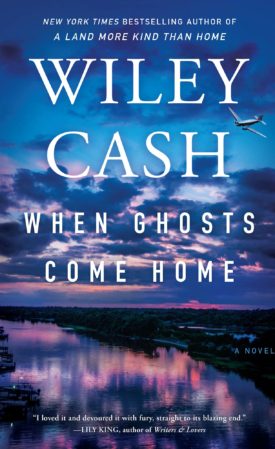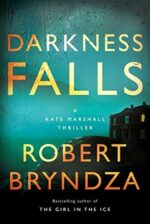 Synopsis:
Synopsis:
When Ghosts Come Home is a tender and haunting story of a father and daughter, crime and forgiveness, race and memory, set in late 1984.
When the roar of a low-flying plane awakens Sheriff Winston Barnes in the middle of the night, he immediately knows something strange is happening at the nearby airfield on the coast of North Carolina. But nothing can prepare him for what he finds. A large airplane has crash-landed and is sideways on the runway, and there are no signs of a pilot or cargo. When the body of a local man is discovered — shot dead and lying on the grass near the crash site — Winston begins a murder investigation that will change the course of his life, as well as the fate of the community that he has sworn to protect.
Everyone is a suspect, including the dead man. As rumors and accusations fly, long-simmering racial tensions explode. Winston, whose own tragic past has followed him like a ghost, must carry out his duties while facing the painful repercussions of past decisions. He also knows that his remaining days as sheriff may be numbered. He’s running for re-election against Bradley Frye, a corrupt but well-connected challenger, and his deputies are choosing sides.
As if those events weren’t troubling enough, Winston must finally confront his twenty-six-year-old daughter, Colleen. She has returned home grieving a shattering loss she cannot fully articulate, as Winston’s beloved wife, Marie, battles cancer.
As the suspense builds and a compelling mystery unfolds, acclaimed author Wiley Cash examines the hearts of richly drawn, achingly sympathetic characters and reveals the nobility of an ordinary man struggling amidst terrifying, extraordinary circumstances.
Review:

Wiley Cash Wiley Cash is the New York Times bestselling author of A Land More Kind Than Home, This Dark Road to Mercy, and The Last Ballad. He holds a Ph.D. in American Literature from the University of Louisiana-Lafayette, an M.A. in English from the University of North Carolina-Greensboro, and a B.A. in Literature from the University of North Carolina-Asheville. His short stories and essays have appeared in The Oxford American, Garden & Gun, Our State Magazine, and other publications. He has taught creative writing and literature at the University of North Carolina-Chapel Hill, Bethany College, University of North Carolina-Asheville, and the University of Louisiana-Lafayette. He currently teaches fiction writing and literature at the University of North Carolina-Asheville, and serves as Alumni Author-in-Residence. He resides in North Carolina with his wife, photographer Mallory Cash, and their daughters.
Cash takes readers back to Oak Island, North Carolina in 1984, beginning the story with local sheriff Winston Barnes feeling more than hearing a plane pass over the home he shares with his wife, Marie, at 3:18 a.m. Neither of them has ever before heard a plane come in at that hour or flying as low as it sounds like this one was. Sixty-three-year-old Winston drives across the bridge leading to the small regional airport, and discovers a single vehicle in the parking lot — a 1978 Datsun registered to Rodney Bellamy, one of Colleen’s classmates. Rodney has no criminal history and is the son of Ed Bellamy, a history teacher — one of the few Black teachers in the county — who “stood up against harassment and violence during school integration.” When he proceeds to the end of the runway, Winston discovers an old military plane, too large for the small runway, with its landing gear broken in half. He also finds Rodney’s body in the grass along the runway. There are no fingerprints in the plane, and Winston’s deputies quickly begin speculating that the flight was a drug run, a theory Ed staunchly rejects. Winston commences an investigation to determine why the plane crashed, where the pilot went, whether Rodney’s death is related to the crash, and who killed him. Rodney’s wife has reported him missing after he left home in the middle of the night to purchase diapers. Now it falls to Winston to inform Ed that his son is dead, and Janelle Bellamy is a widow who must face raising her child alone. Winston must meet with her at her home in the Grove, an old part of town where Janelle’s younger brother, Jay, has come to spend the summer. Jay is fourteen and got into trouble, so their parents felt it would be best if he spent time with his older sister. But he’s again getting into trouble . . . that could prove deadly.
On the same morning, Winston’s daughter, Colleen, makes her way back to Oak Island without telling her husband, Scott, an assistant U.S. attorney in Dallas. They are “two people constructed of pain and grief,” who seem unable to find their way back to each other after the devastating loss of their child four months earlier. Colleen was supposed to take the Texas bar exam after the baby came, but her desire to become a lawyer has been completely usurped by her grief. The only thing she wants is her son — “the only thing she could never have.” Scott’s insistence that they can get through mourning their son together only angers and frustrates Colleen, who is mired so deeply in loss that she cannot appreciate that Scott is also grieving in his own way. Every day she is fixated on the ghosts of the child and future they lost, telling Scott he has no idea what her grief is like. “I can still feel him. I mean inside me, Scott. I can still feel where he was inside me. And now he’s not there, and he’s not here, and I don’t know where he is.”
The Barnes family moved to Oak Island from Gastonia in 1963 after Winston responded to a robbery in progress inside a pharmacy. A man was holding the pharmacist, cashier, and a few customers hostage. When he pointed his gun at Winston, Winston shot and killed him. Winston carries the burden of having taken a life, an event that profoundly and irrevocably changed him.
When Ghosts Come Home is the first murder mystery that Cash has penned and the book is a stunning achievement. Over the course of four days, Winston navigates clues to what happened on that night and why, during the course of which he learns that his opponent, Bradley Frye, and his cronies are unabashedly terrorizing Rodney’s family and other Black residents. When not on duty, he must deal with Colleen’s return and Marie’s ongoing health struggles. Cash injects surprising twists galore on his way to revealing the truth.
He was inspired, in part, by events that took place in the 1980s. World War II-era aircraft ended up on small airfields and even a pasture in North Carolina’s Brunswick and Columbus counties. Their cargo? Drugs. Cash chose to set the book in that era because he sees it as a “rich time” in which to explore themes of racial tension and socioeconomic disparities, in addition to a riveting mystery. Cash grew up in Gastonia in that decade and wanted to plumb the assumptions people had about each other in the midst of turmoil — school desegregation, the AIDS crisis, Ronald Reagan’s presidency, and his wife’s “Just Say No” war on drugs chief among them. As an adult, he found it “interesting to go back there and sort of pick at some of that stuff and look at identity, look at gender, look at class, look at race, look at the legacy of these things and how a lot of the things that I believed in 1984 weren’t necessarily true, and some of the motivations of the people I thought were so just and so uniquely American were not true either.” He believably transports readers back to that time, establishing through his characters the way day-to-day life unfolded before smart phones, the internet, and electric vehicles.
While When Ghosts Come Home may be, in Cash’s assessment, his most plot-driven work to date, it is indeed an intense, emotionally resonant character study, as well. Particularly absorbing is the manner in which Cash portrays Winston’s handling of the issues confronting him and the people he is sworn to protect. He is decent and principled, committed to his career and family, and determined to see justice done, even as the FBI inevitably takes the investigation away from him. Indeed, Winston and Marie take one of the FBI agents into their home, providing him with a place to stay while working on the case. Cash also tells the story from Colleen’s perspective as she realizes that retreating to her parents’ home constitutes a change of scenery, but not an escape from her feelings or the problems in her marriage. And she attains a new appreciation of her parents and their lives. Through Jay, Cash reveals how deep the racial divide in Oak Island is, illustrating how Bradley Frye and the local sycophants who follow his orders terrorize and threaten the young man and his family, riding through the neighborhood at night with Confederate flags flying, hurling racial epithets, and damaging property. Some of Winston’s deputies are aligned with the racist thugs and have no interest in making arrests or protecting the citizens they are determined to intimidate. Winston finds their behavior abhorrent and inexcusable. Frye, the son of a real estate developer, is intent on building tony golf courses and subdivisions, no matter the consequences for the environment or the current residents. Cash wrote the book from 2017 to 2020 and was influenced by the fact that many of the same problems America faced in the 1980s, including “fear of the outsider” resurfaced in recent years, along with the emergence of the Black Lives Matter movement “which played into the construction site in my novel, all of those things came back up.”
When Ghosts Come Home may be set nearly forty years ago, but Cash adeptly observes that the themes of the story “are still haunting us.” Thus, the book is both timeless and timely. His characters are nuanced, flawed but richly empathetic, their struggles relatable. There is no debate about where ethical lines are drawn, which makes Cash’s gut-wrenchingly shocking conclusion to the book all the more powerful and unsettling, as well as hauntingly unforgettable.



Comments are closed.